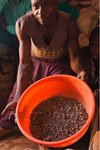
As the issue of conflict minerals continues to be discussed and debated by activists, academics, and policymakers, the trade on the ground in eastern Congo rages on. There have been several recent trends that are having a significant effect on the global supply and demand of conflict minerals sourced from Congo. Here are a few that have caught our eye:
- The prices of the 3Ts and gold are on the rise again, after a slight fall last year, meaning that there is growing incentive for mineral companies and smugglers sourcing from eastern Congo to increase extraction and sales while the iron remains hot. Over the past year, the price of tin has jumped dramatically, increasing over 50 percent while tantalum has also increased at least 30 percent (many industry experts say much higher than that, upwards of 100 percent). Tungsten prices have risen 15 percent, and gold prices have increased roughly 25 percent.
- U.S. and European banks have begun to deny loans to metals companies suspected of trading in conflict minerals from Congo. Examples of this include the Malaysian Smelting Corporation, one of the worlds largest buyers of Congolese cassiterite (tin) ore, which is reportedly having difficulty obtaining lines of credit from banks for ore coming out of the Great Lakes region of Africa, and Thai based company, Thaisarco, who has had to halt its Congolese ore purchases due to pressure from advocacy groups.
- More U.S. jewelry companies are coming out in support of the conflict minerals provision in the Frank-Dodd Act, signed into law in July. The San Francisco based company Brilliant Earth has come out in support of the bill and is working towards finding solutions to tracing and certifying gold used in jewelry to ensure it is conflict-free. Given the opposition of most jewelers to the bill, support from companies like Brilliant Earth is crucial to the Congo conflict-free movement.
- To put in perspective the importance of tantalum in cell phones, Rick Pierson, a senior analyst for iSuppli, stated in a recent report: “Consumer products like Apple’s iPad contains 702 tantalum capacitors, while the iPhone 4 has 469.” Companies that use tantalum capacitors in products must also use tantalum wire due to the heat resistance of the ore. Tantalum industry insiders have told Enough on more than one occasion that there is no supply of tantalum wire that can be called conflict-free today.
- And in a surprising development, a representative of the North Kivu Mining Authority told Enough that a decision announced by President Kabila last week to suspend mining in Walikale was extended to all of North Kivu, South Kivu, and Maniema mines. Mining businessmen in Goma have confirmed the suspension, and mining traders are said to have been given four to six weeks to remove all of their products and tools in the mining sites. At the same time, state agents in areas that would be affected by the suspension (Walikale, Masisi, etc.) are reported to have started seizing minerals loads that were awaiting air shipment to Goma. This story is just beginning to develop, so stay tuned…
Photo: A miner shows a bin of tin ore (Grassroots Reconciliation Group/Sasha Lezhnev)

